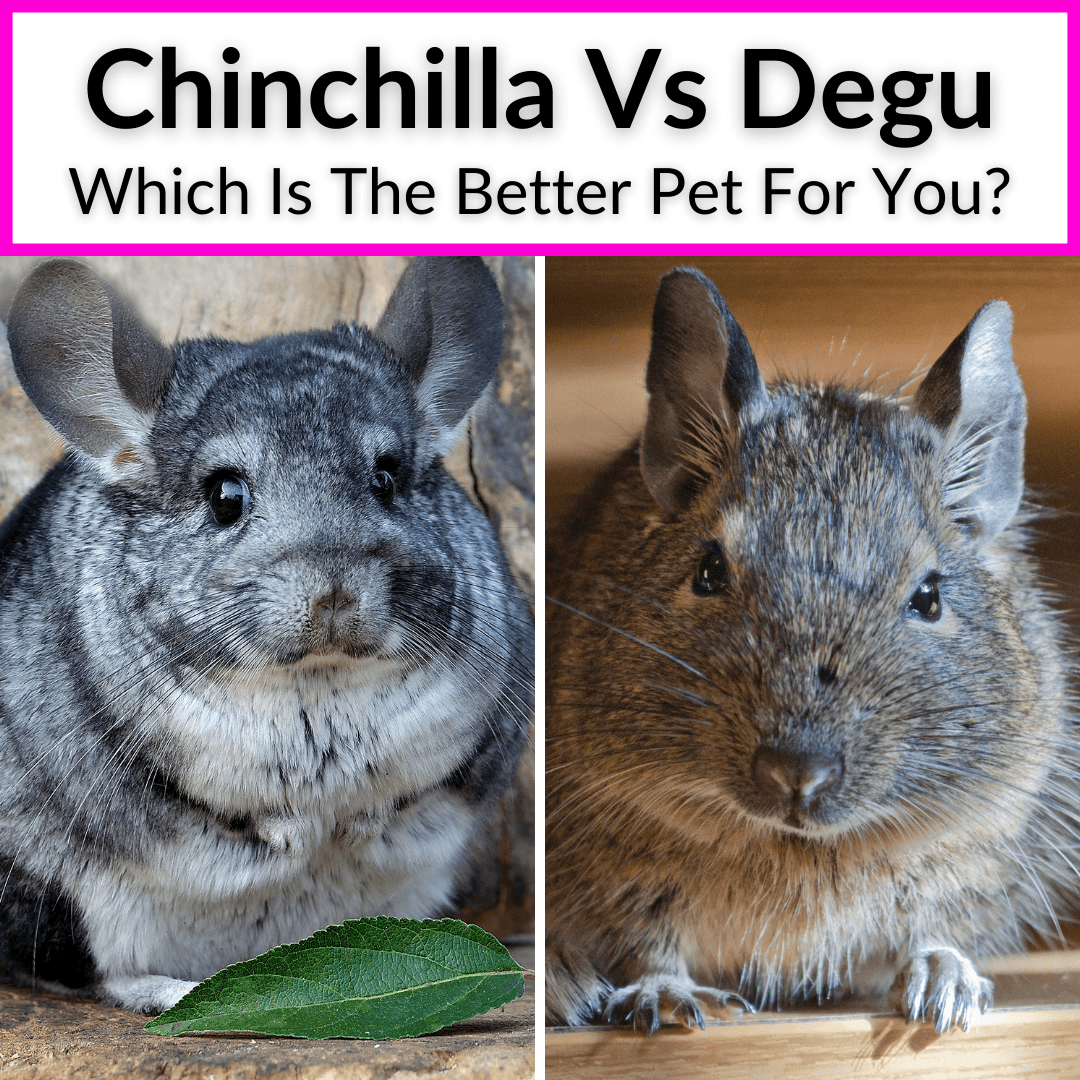
In comparing the degu vs chinchilla, you quickly notice a lot of similarities.
But that is deceiving.
There are a number of key differences between the chinchilla and the degu.
And it is those differences that will likely make one better suited as a pet than the other.
Which one depends on you. It won’t be the same for everyone.
Keep reading for an in-depth comparison of these two adorable little furballs. By the end, you should have a solid idea as to which one is right for you.
Contents
- 1 Degu Vs Chinchilla
- 2 Can Degus Eat Chinchilla Food?
- 3 Chinchilla Vs Degu: Final Thoughts
Degu Vs Chinchilla
We will begin our chinchilla vs degu comparison by looking at each animal individually, before diving into the differences and similarities between the two.
Then we will cover the advantages of each and why each makes a good pet. These last sections should help the most in deciding which one to get.
What Is A Degu?
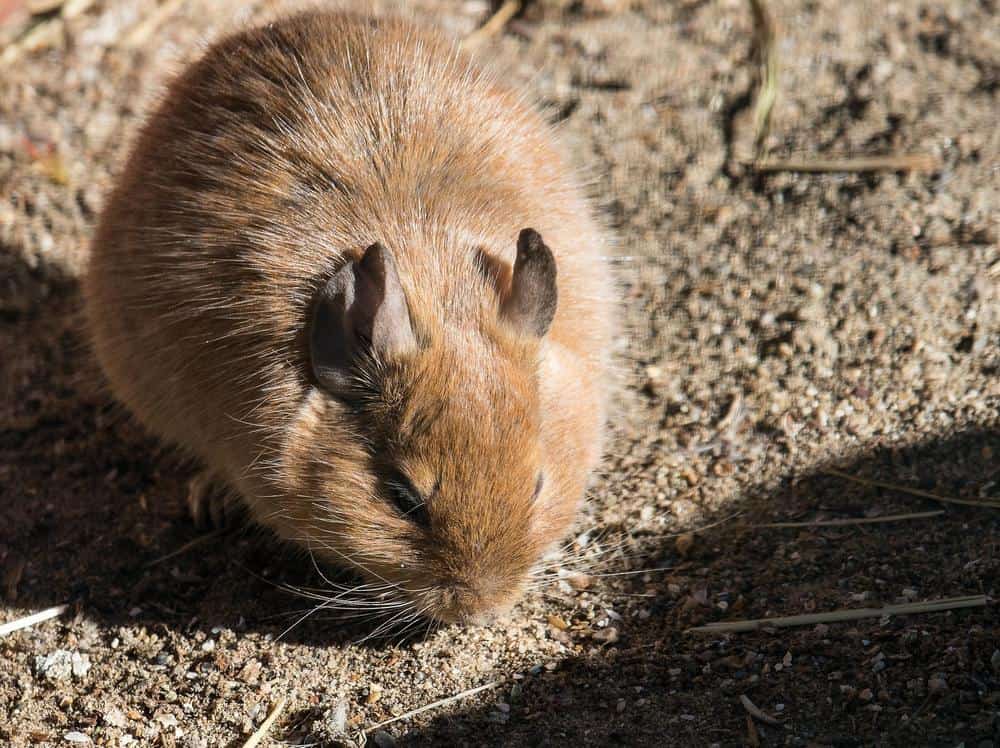
The degus is a caviomorph rodents native to Central and Northern Chile. These small, furry animals are a relative of guinea pigs and chinchillas. Then degu is a social animal with amazing personality traits.
This rodent makes for a great pet due to its friendliness, habits, and sleep cycle. Taming degus from an early age is also possible.
Degus are typically 10 to 12 inches long, larger than an average-sized hamster, and smaller than an average rat. On average, an adult degu weighs between 170 and 400 grams.
These playful creatures typically live for around 6 to 8 years. However, the maximum life span for a degu is 13 years of age. But degus rarely meet their life expectancy of 13 years due to poor genetics and genetic pool.
Degus are relatively quiet critters that you can recognize by their large ears. Typically, they have gray toes, long tails, furry ears, and yellowish-brown bodies. That said, degus come in various colors, including brown, cream, black, white, and even blue.
Degus thrive on social interaction and play and prefer living with a mate rather than alone. You may also notice these cute rodents making low warbling sounds when grooming one another. Their social qualities and curiousness make them an ideal pet for your home.
What can degus eat? Their main food sources in captivity should be Timothy hay and food pellets, the same as chinchillas.
What Is A Chinchilla?
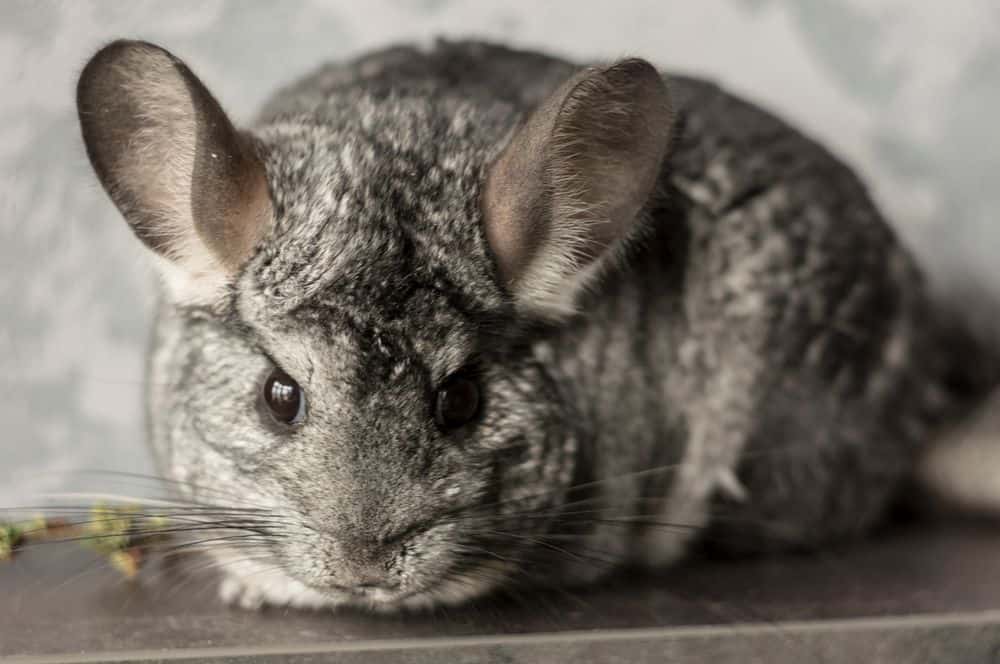
Similar to degus, chinchillas are also social rodents native to the Andes mountains of South America. Originating from northern Chile, chinchillas typically prefer living in colonies at high elevations. Like most rodents, chinchillas are also quite social and thrive in groups.
There are two types of these soft and furry animals: chinchilla brevicaudata and chinchilla lanigera. The major difference between the two species is their size. Chinchilla brevicaudata are also sometimes referred to as short-tailed chinchillas.
The bodies of short-tailed chinchillas grow to about 11 inches in length while weighing about 400 grams. On the other hand, long-tailed chinchillas, or chinchilla lanigera, grow 8 to 10 inches long and can reach approximately 1 kilogram in weight. It is more common for people to keep long-tailed chinchillas as pets in their homes.
Although chinchillas are more nocturnal than degus, they are still quite active and curious when awake. Are chinchillas playful like degus? Yes, they love to run, climb and jump. It is for this reason that they make for great interactive pets.
These fluffy animals are also intelligent and easy to care for, because they easily fall into a set routine of eating, playing, and sleeping.
Visually, chinchillas come in colors like black, violet, grey, ebony, white, beige, and other similar shades and hues. The soft yet dense, furry overcoat is why people also hunt these animals to make coats, etc.
Chinchillas typically live between 10 to 20 years of age. While maximum life expectancy is 20 years, 15 years is the average age for a chinchilla in captivity.
Differences Between Degus And Chinchillas
Degus are a relative of the chinchilla. They belong to the same family, making it hard for you to differentiate between the two furry animals. Irrespective of the similarities, degus and chinchillas are quite different. Let’s have a quick look on some factors that make them different.
Lifespan
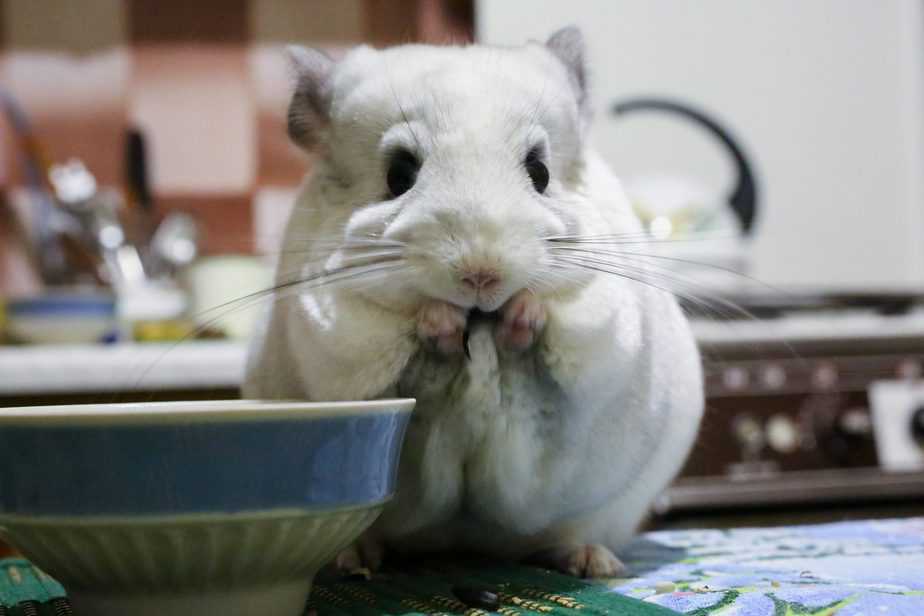
Generally, degus live up to 8 years of age in captivity, but they often survive for 9 or more years in their community. However, degus do not survive as long in the wild and typically have a lifespan of only 4 years. This is due to predators that hunt them primarily in the early years.
Chinchillas have a longer lifecycle, and in a caged habitat, they can easily survive up to 10 to 20 years. But this is only possible when the owner provides chinchillas with the right environmental conditions and diet, etc.
In the wild, chinchillas are better at avoiding predators and can live for 8 to 10 years.
Size
Size is a huge factor in distinguishing between degus and chinchillas. Simply put, degus are smaller in size than chinchillas.
On average, an adult degu grows between 25 and 30 centimeters long, including the length of the tail. This equates to a length of about 10 to 12 inches.
You can compare an adult degu to a small, young hamster. While degus reach maturity at about 7 to 8 weeks after birth, they do not reach their adult size until they are a few years old.
In the case of chinchillas, the adult size ranges between 23 and 38 centimeters. This is about 9 to 15 inches. While chinchillas are typically the size of a golf ball at birth, they can grow into their adult size aa early as 8 weeks of age. Essentially, this is the size of a small-sized pet cat.
Character
While the character is an important distinguishing factor, the personalities of both degu and chinchilla are hard to define. Both rodents can be skittish and alert to noises.
Naturally, degus and chinchillas are always looking out for possible predators. It is near impossible for both the animals to lose their alertness, eve after years in captivity.
For degus, introduction and getting comfortable takes quite some time and lots of patience. Once a degu becomes sure that you’re not a threat, it will expect more interaction and treats.
On the other hand, the personality of chinchillas is quite laid back. This suggests that creating a strong bond with chinchillas is not as hard. A chinchilla loves attention and care and will express its joy and happiness most of the time.
Similarities Between Chinchillas And Degus
Both the degu and the chinchilla are small rodents native to South America. Many people believe that the two are cousins from the same family, with the guinea pig being another cousin. This is why the two popular household pets have so many similarities.
It is hard to distinguish between the two at first sight, because degus and chinchillas look so similar in appearance. Both are small, furry, and fluffy animals. The colors of their fur coats are also quite similar, due to the color range the two animals come in.
When it comes to behavior, both degus and chinchillas are incredibly alert animals. This helps them keep away from potential predators. It may take some time before they can fully trust you.
That said, degus and chinchillas are also extremely friendly and affectionate. It is normal for these pets to express their affection to their owners and other family members in the house. Not to forget, both rodents are also playful and active animals.
Advantages Of The Degu
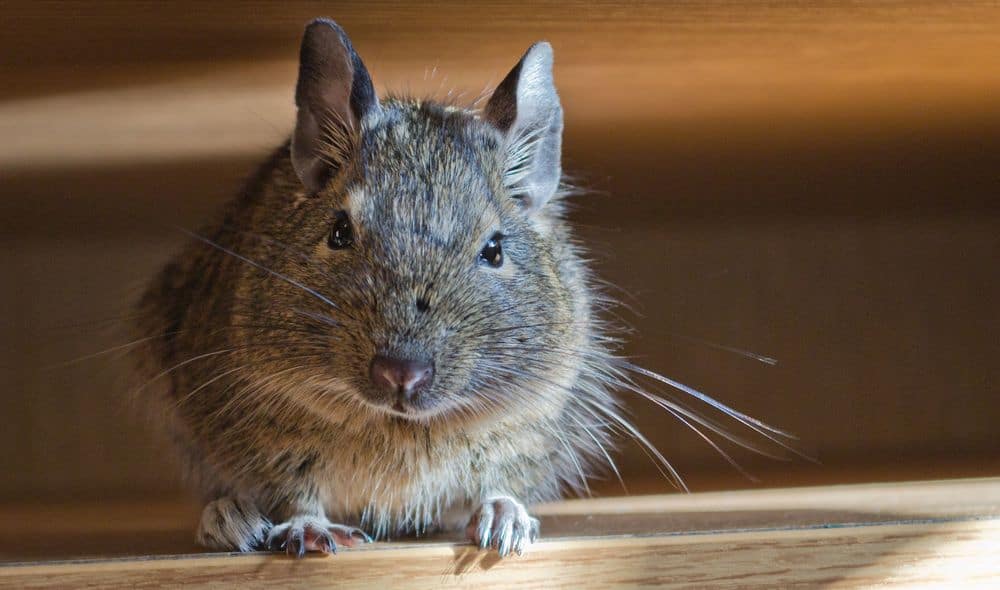
- Intelligent and clumsy: Pet degus will provide excellent entertainment in your home when they play and fight.
- Easy to clean: You do not need to set a bath routine for degus as they normally do not require one. While they don’t get dirty, they can clean themselves if they ever do. Just make sure to clean the cage and bedding, etc.
- Social and friendly: Degus can easily adjust with other pets in your home, due to their friendly and social personality.
- Easy to care for: Degus do not have any specific care requirements. You can just let them be and rest assured that they won’t need anything. Feeding is also easy, as they do not depend on specific pet food.
- Affectionate: Degus are friendly with children and love their owners. Most of the time, they will also express their affection in a variety of ways.
Advantages Of The Chinchilla
- Long life: It is common for pet chinchillas to live for more than 15 years, so your little friend will be around for a long.
- Low maintenance: You do not need to do much to take proper care of your chinchilla. They need food and water every day and clean their cage and bedding once a week. They are also not susceptible to any infestation.
- Easy to clean: In simple words, chinchilla poop is hard in consistency and very easy to clean. But there is a lot of it.
- Easy baths: Chinchillas do not have a bad smell despite never bathing in water. Instead, they take dust baths 2 to 3 times a week.
- Friendly and affectionate: Like other rodent animals, chinchillas are quite friendly and form close bonds fairly quickly. They love to play and express their affection.
Why You Should Get A Degu
How are degus as pets? A degu is a suitable pet for people of all ages, especially children. This is because they have a set sleep cycle similar to that of humans.
Degus prefer sleeping at night and playing during the day, so they are good for involving children in activities that will help expend their energy.
If you provide them with the right conditions, setup your degu cage properly, and handle them the right way, degus thrive happily and get attached to owners and family members easily. While they can live in all kinds of households, do not leave them unattended in the presence of other animals that can hurt them.
Exercise
To keep your pet degu happy and healthy, you must involve the playful animal in at least 1 hour per day of intense physical activity. The habitat must also have enough space to allow running, jumping and climbing, etc.
Training
Degus are highly intelligent, so they do not take much effort to train. You only need them to get familiar with your voice and hand gestures. However, patience and time are still necessary. And don’t forget to use treats.
Why You Should Get A Chinchilla
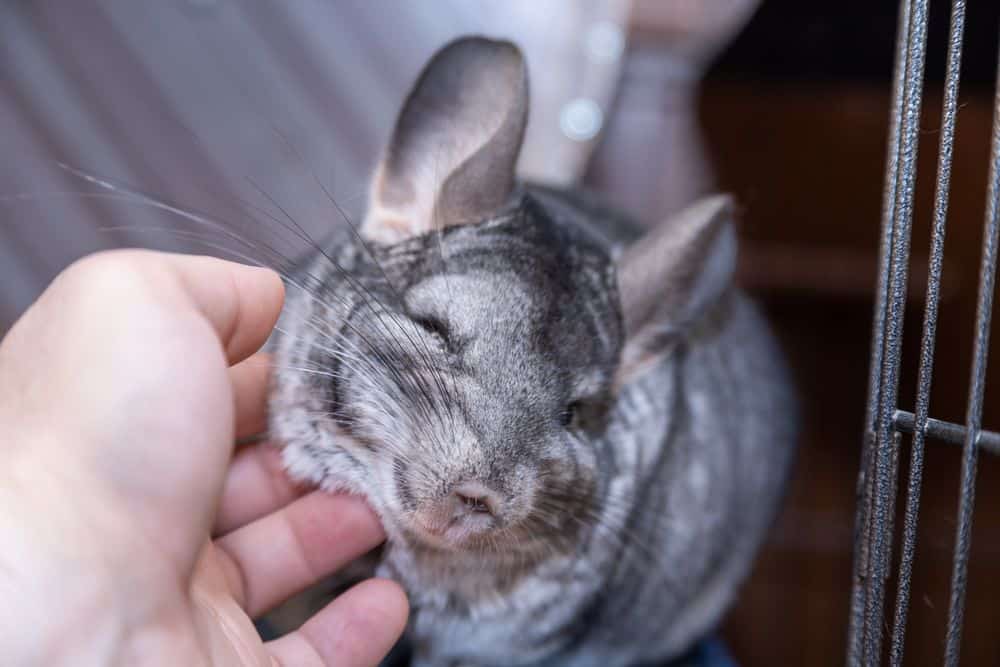
Chinchillas are excellent habitat dwellers and can adapt to both big and small apartments and houses. However, the household must be safe and relaxing and not pose any danger to the safety of your pet chinchilla.
Exercise
Chinchillas can become obese and quickly grow older if they do not get about 1 to 2 hours of vigorous physical activity daily. Enough space to explore and run around is a necessity. Letting your chin interact with objects is also a fantastic idea for keeping it active and involved.
Training
It is not as easy to train a chinchilla as a pet cat or dog. However, you can still train them to do a few things like using a litter box or responding to your voice. Positive reinforcement and treats are necessary to train a chinchilla.
Can Degus Eat Chinchilla Food?
Yes, you can feed degus chinchilla food, but there are a few things to look out for. Degus are even more sensitive to sugar, so you want to make sure that any chinchilla pellets you feed your degu do not contain molasses or other ingredients high in sugar. As for the hay you feed your chinchilla, this is perfectly fine for degus.
Chinchilla Vs Degu: Final Thoughts
Both of these animals are adorable little rodents that make excellent pets. They are quite similar, but there are also a number of key differences between them.
Obviously I prefer the chinchilla (the name of this site should be a dead giveaway, in addition to the hundreds of photos of me with my chin), but I understand they are not the best pet for everyone.
Hopefully comparison of the degu vs the chinchilla has helped you figure out which one of these furry little creatures is the better pet for you. The good news is that you can’t go wrong, whichever decision you make. They are both incredible pets!
And if you find that neither completely appeals to you, perhaps because you want something more exotic, you could also consider a viscacha. It is very similar to the chinchilla, but is not a common pet at all. See our comparison of the viscacha vs chinchilla for more.
Of course, viscachas are hard to find and they do make the best pets. Another cool, exotic, and super cute option is the hedgehog. We have a comparison of the chinchilla vs hedgehog here.
Leave a Reply